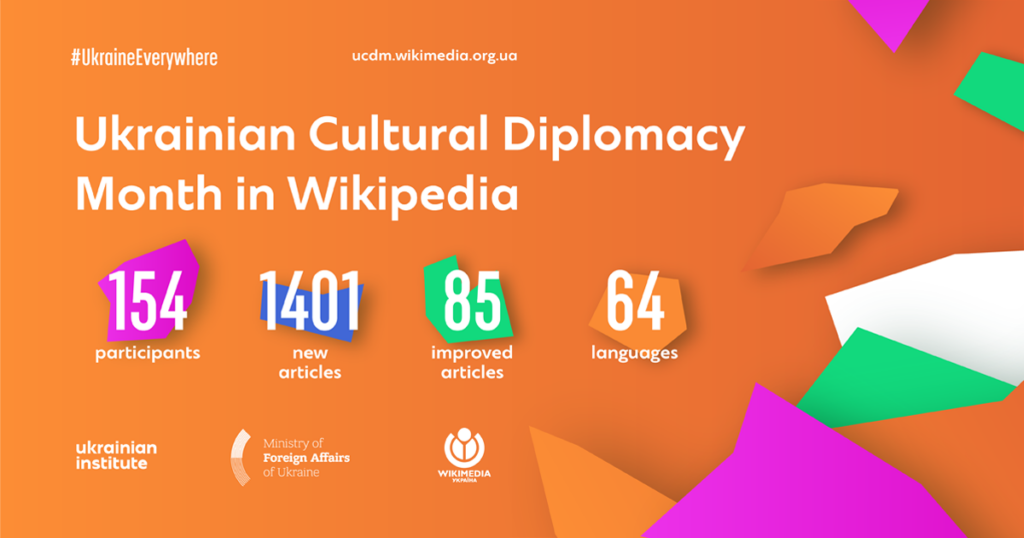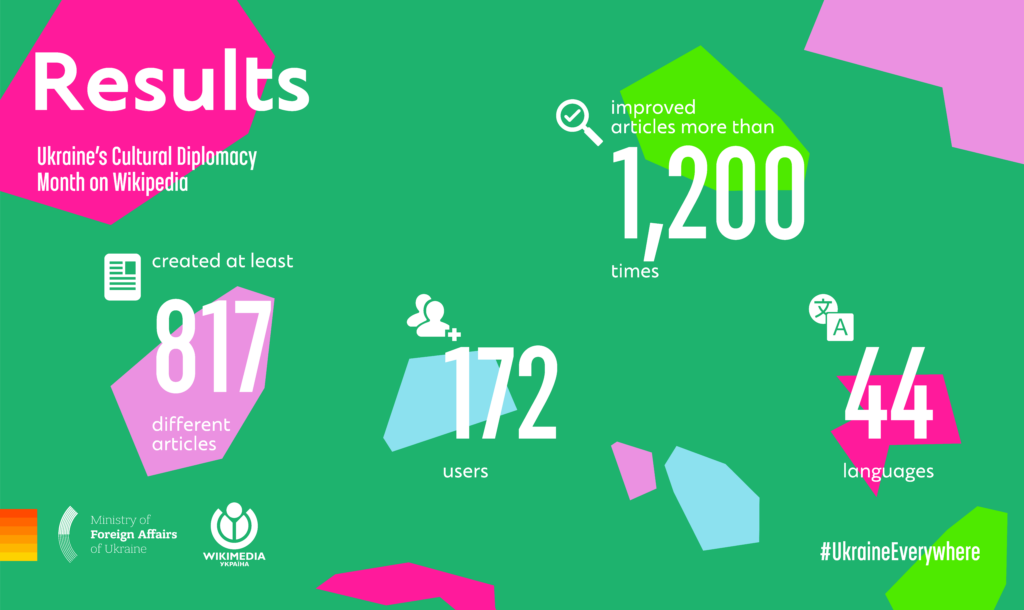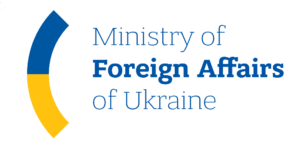Ukraine’s Cultural Diplomacy Month on Wikipedia
#UkraineEverywhere is the motto of the annual international information campaign entitled Ukraine’s Cultural Diplomacy Month. The campaign is designed to create more articles about Ukraine and its culture in Ukrainian and other languages in Wikipedia.
About the programme
Ukraine’s Cultural Diplomacy Month is dedicated to famous Ukrainian artists of cinema, music, literature, architecture, design, who have made a significant contribution to world culture and about whom there are no articles in Wikipedia. As part of the campaign, volunteers create new articles in Ukrainian and foreign languages to spread factual information about Ukraine in different regions of the world.
Ukrainian Cultural Diplomacy Month 2024
From March 1 to March 31, the Ukrainian Institute, the Ministry of Foreign Affairs, and Wikimedia Ukraine will hold the annual information campaign ‘Ukrainian Cultural Diplomacy Month 2024’. The campaign aims to increase the number of articles about Ukraine and its culture in foreign languages on Wikipedia.
Ukrainian Cultural Diplomacy Month 2023
In March 2023, Wikipedia hosted the Ukraine’s Cultural Diplomacy Month for the third time.
The campaign was joined by 154 participants from all over the world. They wrote 1,401 new articles and improved 85 existing ones in 64 different language sections of Wikipedia. In particular, they created articles about the phrase “Glory to Ukraine!” in Estonian, the play Natalka Poltavka in French, the films Earth and Shadows of Forgotten Ancestors in Hungarian, Ivan Marchuk in Japanese, the novel The City by Valerian Pidmohylny in Arabic, and the Kuindzhi Art Museum in Chinese.

“This is the third Ukraine’s Cultural Diplomacy Month since the Ministry of Foreign Affairs launched this initiative in 2020. The full-scale aggression of the Russian Federation not only failed to stop it, but made it even more significant. I am grateful to each and every author who has responded to our call this year, creating and improving almost 1,500 articles about Ukraine in 64 language sections. Through the joint efforts of the state and civil society, we are countering Russian propaganda and systematically updating the global information space with truthful facts about Ukraine and its culture,”
commented Dmytro Kuleba, Minister of Foreign Affairs of Ukraine.
Participants' feedback
“I wanted to help Ukraine somehow. One of the ways, I figured, was by raising awareness about the depth of Ukrainian culture. This time, I focused specifically on translating articles about places of interest in Ukraine, such as museums, theaters, and opera houses. I hope the information would drive more people to visit Ukraine after the war, bringing in some tourist revenue,”
— participant Nyagoslav Zhekov from Malaysia.
I joined your Campaign to honor my late mother. She was in Europe in mid ‘60s, and cherished the children’s book based on Ukrainian fable of a mitten hosting forest animals,”
— participant Omotecho from Japan, joined the project for the third time.
Winners 2022
In February-March 2022, Wikipedia hosted the “Month of Cultural Diplomacy of Ukraine” for the second time. It was aimed at creating and improving articles about Ukraine and Ukrainian culture in as many languages as possible.
During the month of the campaign, 253 participants joined it. 29 of them took part in the marathon for the second time, 224 joined for the first time this year.
In total, they wrote 3,813 new articles and improved 262 existing ones in 60 different language sections of Wikipedia. That’s five times more than last year. In particular, articles about Pavlo Tychyna in Arabic, about Anna Yaroslavna in Finnish, a painting “Moonlit Night on the Dnieper” in Chinese, a dance “Hopak” in Persian, about the Ukrainian avant-garde in German, and a novel “Shadows of Forgotten Ancestors” in French.
There are also articles in unique languages in small language sections of Wikipedia. The article about Ukraine was published in Nahuatl, about Kyiv in Shilha, Ahatanhel Krymskyi in Central Bikol, Taras Shevchenko in Tagalog, and Yurii Vynnychuk in Bashkir.
Results 2021

Winners 2021
As part of #UkraineEverywhere campaign 2021, 172 users created and improved articles more than 1,200 times (several users could edit one article), and created at least 817 different articles in Ukrainian and foreign languages. Participants created articles about things we are used to in new languages: for example, articles “Mnohaya lita” and “Borsch” in Malayalam (India) and an article about “Executed Renaissance” in Chinese. Actively in many languages added articles to Wikipedia about the brand of Ukraine – Ukraine NOW; famous Ukrainian films of recent years – Atlantis, Donbass; Dzyga Vertov, Sofia Yablonska.
Portuguese, English and French became the leaders in the number of added and revised articles. The project aroused considerable interest in Asian countries. #UkraineEverywhere campaign covered 44 languages in total: Afrikaans, Arabic, Aragonese, Assamese, Azerbaijani, Bangla, Bashkir, Bengali, Bosnian, Bulgarian, Catalan, Chinese, Croatian, Dutch, Egyptian Arabic, English, Finnish, French, Galician, Georgian, German, Indonesian, Italian, Japanese, Korean, Luxembourgish, Macedonian, Malayalam, Occitan, Persian, Polish, Portuguese, Punjabi, Romanian, Russain, Serbian, Serbo-Croatian, Spanish, Swedish, Tagalog, Telugu, Ukrainian, Urdu.
The project included two webinars (in Ukrainian and English) that helped to get acquainted and better understand the writing of articles for Wikipedia. More than 150 participants joined the webinars.
Participants’ feedback






“Thanks to this project, hundreds of new articles have appeared on Wikipedia in different languages about Ukraine, its culture, achievements and potential. People all over the world will be able to learn something new about our country. I am convinced that this will encourage many of them to later visit Ukraine, study there or invest in it. We will definitely work for the development and success of this project in the future”.
— said Dmytro Kuleba, Minister for Foreign Affairs of Ukraine.
"It is important for the Ukrainian Institute that culture becomes a unifying force and helps to build Ukraine’s ties with the world. In this project we managed once again to achieve it. Ukraine's Cultural Diplomacy Month gathered participants from dozens of countries, including experienced wiki writers interested in Ukraine as well as foreign Ukrainians, students, and university professors".
— commented Volodymyr Sheiko, Director General of the Ukrainian Institute.


